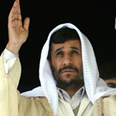
Iran is no threat to Israel, says top Iranian official
Iran's chief nuclear negotiator tells security officials in Germany that Tehran's nuclear ambitions are no threat to Jewish State, as Ahmadinejad vows to pursue nuclear know-how but says wants to stay within international rules
Iran's top nuclear negotiator told a meeting to international security officials in Germany that Tehran's civilian atomic program was no threat to Israel.
"That Iran is willing to threaten Israel is wrong," said Ali Larijani. "We pose no threat and if we are conducting nuclear research and development we are no threat to Israel. We have no intention of aggression against any country."
Larijani, speaking in Germany at a forum that gathered the world's top security officials, said his country was willing to negotiate a compromise through negotiations with the International Atomic Energy Agency, headed by Mohammad ElBaradei.
"I have written to Mr. ElBaradei to say we are ready to within three weeks to have the modality to solve all the outstanding issues with you," Larijani said at the forum.
In Israel, Foreign Ministry spokesman Mark Regev dismissed Larijani's comments, saying Iran's government was trying to convince the international community to believe that their intentions are benign.
"The fact is that they have failed in this attempt and there is a wall-to-wall consensus that the Iranian nuclear program is indeed military and aggressive and a threat to world peace."
On Friday, the IAEA suspended nearly half the technical aid it provides to Iran, a symbolically significant
punishment for nuclear defiance that only North Korea and Saddam Hussein's Iraq had faced in the past.
Meanwhile, Iranian President Mahmoud Ahmadinejad marked the 28th anniversary of Iran’s revolution on Sunday pledging to pursue the country’s nuclear program but stopping short of announcing any fresh nuclear moves.
Ahmadinejad, under pressure at home to tone down a confrontation with the west, ruled out a UN demand to suspend uranium enrichment while also saying he wanted to remain within international rules.
Iran has until Feb. 21 to halt uranium enrichment, a process that can make fuel for power stations or, if greatly enriched, material for warheads. A UN sanctions resolution passed in December threatened further measures if Iran refuses.
“We are ready for talks but will not suspend our activities,” Ahmadinejad told hundreds of thousands of Iranians in Tehran’s Azadi (Freedom) square to mark the 1979 Islamic revolution, saying suspension would be “humiliation.”
“The Iranian nation is interested in continuing its nuclear activities in the framework of the (International Atomic Energy) Agency’s regulations and treaties,” he said.
'Great' achievements soon
But he said Iran would announce “great” achievements in the days up to April 9, “especially nuclear” developments. Despite Western accusations that Iran wants atomic weapons, the president repeated Iran’s assertion that its plans are peaceful.Ahmadinejad’s promise to celebrate what he calls Iran’s nuclear rights during Sunday’s events had prompted talk that the anti-Western president might say it had begun installing 3,000 centrifuges at its Natanz uranium enrichment plant.
Prior to the speech, a senior Iranian official had told Reuters no such announcement would be made that would provoke the West. Pragmatist voices, increasingly prominent in Iran’s ruling elite, have been counseling a more cautious approach in Iran since the UN sanctions were imposed.
Iran already operates two experimental cascades, each of 164 centrifuges at its Natanz facility. Western diplomats say Iran has also set up an additional two cascades in an underground section of the facility, the first stage towards building thousands for what Iran calls “Industrial-scale” enrichment.
A proposal being considered by some European states would permit Iran to keep its enrichment infrastructure of several hundred centrifuges but it would not be allowed to feed any processed uranium hexafluoride (UF6) into the machines while negotiating with six world powers over a package of incentives.
Worried Iran would gain nuclear skills by vacuum-testing centrifuges, neither the United States nor Britain would find the idea very attractive, some Western diplomats said.
Talks last year between Iran and six world powers—the United States, Britain, Germany, France, China and Russia—failed after Tehran refused to suspend enrichment work.
After almost three decades, many Iranians, especially the young, have lost interest in the revolution. But most remain proud of their country’s nuclear program.
“I am so proud of Iran’s atomic achievements. Nuclear technology is our right,” said government employee Ebrahim Ahmadizadeh, 24, who attended Sunday’s events in Tehran wearing a white shroud symbolizing his readiness to die for his country.










